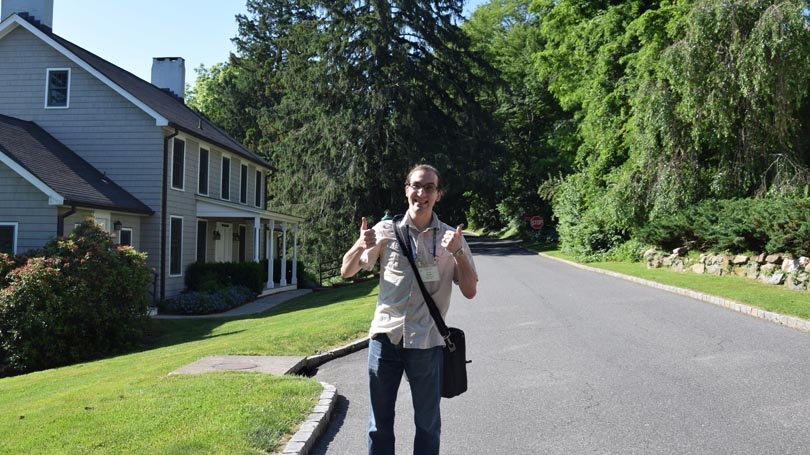
Liviu (Lance) Cengher gives the thumbs up at Cold Spring Harbor Laboratories, NY where he completed research thanks to the Alumni Resarch Award (Photo: Désirée Böck)
The Dartmouth Graduate Alumni Research Award is funded through the generosity of alumni of Dartmouth graduate programs. Every school year, graduate students can apply for funding of up to $1000 to support their thesis research.
One of the great challenges that human kind has faced, and still faces now, is infectious disease. Although we have known about infectious diseases for thousands of years, and have taken steps to quarantine and avid them, only in 19thcentury have we recognized that many of them are caused by microorganism like bacteria. Since then lot of progress has been made to fight pathogenic bacteria, like the development of antibiotics, vaccines, and medicine, but there is still so much that we do not understand. Pathogenic bacteria (the species that cause disease) are still a huge problem even in developed countries. My research focuses on understanding how pathogenic bacteria "think," with the ultimate goal of being able to develop novel antibiotics and molecular inhibitors that can slow down or neutralize these harmful bacteria. To quote from the movie Starship Troopers: "To fight the bug, we first must understand the bug."
Staphylococcus aureusis a predominant cause of hospital acquired infections and can cause a wide range of disease including soft tissue infections, sepsis, pneumonia, and bloodstream infections. In some cases it can cause untreatable wounds that eventually require amputation, in others a seemingly benign infection can infiltrate the bloodstream causing sepsis (which can kill within hours). The goal of the Cheung Lab as part of the Microbiology and Immunology department here at Dartmouth is to study Staphylococcus aureusand its antibiotic resistant cousin, MRSA, in order to develop effective treatments against it. As part of three branches of the lab we study drugs that can be used to kill the bacteria, the way that the bacteria detects drugs or other threats in order to respond to them, and ways that the bacteria coordinates its intracellular machinery in order to respond with antibiotic resistance or virulence factors.
What enables S. aureusto to thrive in the human body and cause diseases is the well adapted responses of these bacteria. In some way they are like predators, who can assess the behavior of their prey and respond accordingly. S. aureus has an incredibly diverse toolkit when it comes to attacking their human hosts, and it has complex ways of deciding which tools to use. These attacks are mediated by the expression of virulence factors, small proteins that can cause harmful effect in the human body. I study the how Staphylococcus aureusdecides how, when, and why to release these virulence factors.
My research focuses on the ways that S. aureus can control the expression of these virulence factors, with emphasis on a newly recognized forms of regulatory factors known as small regulatory RNAs (sRNAs). It has been known for decades that protein-based regulators, like transcription factors, are key in bacterial decision-making. Much research has focused on gaining a complete understanding of this regulation in the hope of being able to inhibit the ability of bacteria to adapt to hosts. However, this research has had gaps when trying to understand regulation purely from a protein-focused perspective. These gaps are now being filled in by the recently discovered RNA-based regulators, like sRNAs. sRNAs play important roles in regulatory pathways and understanding them is key to being able to target virulence pathways in the bacteria. On top of that, these RNA based molecular machineries, like CRISP, have been revolutionary for biotechnology and are a hot topic in current research.
However, RNA is notoriously difficult to study and to work with. Unlike proteins, RNAs molecules are unstable and delicate, degrade quickly, and there is less of a knowledge base for them. Recent breakthroughs in the field of RNA study came with the advent of new technology allowing researchers to examine fragile macromolecules like RNA and to generate and interpret huge computationally examined datasets.
With support from the Dartmouth Alumni Fund I was able to improve my research in both quality and efficiency. This allowed me to conduct experiments and train with internationally renowned researchers like Dr. Angelica Gründling from Imperial College, London, Dr. Andrew Camilli from Tufts University, Boston, and Dr. Lionello Bossi and Dr. Nara Figueroa-Bossi, from I2BC – CNRS Gif-sur-Yvette, France at Cold Spring Harbor Laboratories, NY. It was a great opportunity to work together with these researchers who are experts in working on bacteria that cause infectious disease. In short, Dr. Gründling is a Staphyloccocus aureus researcher with a lot of experience in antibiotic resistance and knowledge of useful tools for S. aureus, Dr. Camilli is a Vibrio cholera researcher with a deep background in bioinformatics and computational tools, and Dr. Bossi is a Salmonella typhymurium researcher who has done a lot of work with sRNA regulation and function in gene regulation.
Research with infections disease is difficult work, with inherent risk when handling the organisms, and great mental effort required to understand the results of the experiments we run on the bacteria. Fortunately, this work is made a lot easier by the mentorship and experience of people who have worked in this field for a long time and know the best ways to study these organisms. I am extremely thankful to my Principal Investigator (or P.I., who runs our lab and supervises us), Ambrose Cheung for all the guidance I have received from him. I am also extremely thankful to the Alumni Research funding for giving me the opportunity to go out and train with a group of international researchers focused on combating infectious disease. This training has had an enormous positive effect of the quantity and quality of my work, and I cannot overstate what a opportunity this was to my professional development and the research I do here at Dartmouth.